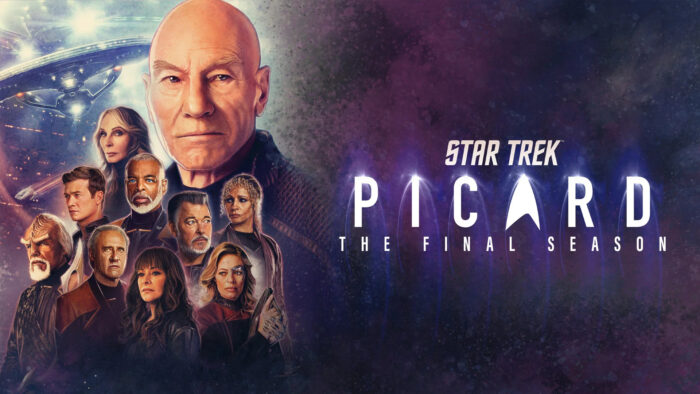‘Star Trek: Picard’ Resists Alien Assimilation to Boldly Celebrate Heroes and Family
Last Thursday my wife and I engaged Star Trek: Picard’s final episode.
For this, this was better than a major theatrical release. We were tensing, cheering, gasping, crying, and ultimately, rejoicing. This show made us feel like we’d seen our first cinematic eucastrophe.
Yes, the third season of Star Trek: Picard really is that good. That’s especially true if you grew up enjoying the Enterprise-D crew’s adventures across seven seasons, or at least some of their continuing cinematic missions aboard the Enterprise-E. I’ll wager even Trek newcomers would find something to love. But longtime Trek fans will get the most enjoyment from long-open plot resolutions and, frankly, some drastic tonal and thematic course corrections after Picard‘s first two seasons got trapped in postmodern spatial anomalies.
If you’re still skeptical, especially after the grimdark mess and leftist elements of Discovery, I’d like to win you back aboard.
Beware: Starships don’t have spoilers, but the following appeals probably will.
What makes Star Trek: Picard season 3 so engaging?
- This is not just a series, but a ~ten-hour film celebrating Star Trek: TNG.
- Picard also manages to celebrate/continue themes from DS9 and Voyager.
- Unlike a certain other Star franchise, every original top crew member returns.
- And they behave like themselves, if not more so, yet with years’ extra experience.
- The showrunner Terry Matalas (mark this name!) respects all canon, down to console details.
- Writing jumps into warp factor 9, thanks to craftspersons who know the myth and meanings of Trek.
- Cameras linger for a change on seemingly simple starship flybys, asking audiences to feel awe at these fantastical ships.
- “Easter eggs” and fanservice-y moments feel 100 percent earned by labor and tragedy. All add meaning to heroes’ journeys.
- However dark the story, it never revels in grimdark violence (like Picard season 1). Any heroes who die sacrifice their lives, rather than having their lives stolen by a writer who wants to “wreck” you. Unlike season 1, or the film Nemesis (2002), no one dies meaninglessly.
- Finally, oh, the music. Two composers, Stephen Barton and Frederik Wiedmann, have assembled a masterclass in soundtracking that honors yet builds upon all the Trek greats: Alexander Courage, Jerry Goldsmith, James Horner, Dennis McCarthy, and many more. When The Next Generation fanfare returns (based on Goldsmith’s The Motion Picture score), even an android might shed a tear.
Should I start with Picard season 1?
You really don’t need to do that. Yes, I watched that season, but the grimdark elements and frankly transhumanist ending soured the series. I didn’t even try season 2. From all I’ve seen, season 3 honors this continuity yet charts its own course. And not a moment too soon.
Okay, so did seasons 1-2 show anything important?
I’ve checked in with article summaries or Memory Alpha. But you may only need to know these plot points (spoilers):
- Picard’s now an android. (“He’s a robot!”) I am not making this up.
- He had a lethal disease, but got his soul(?) switched to an android body. They thought this ironic, vs. Data.
- They even did a whole visual symbol with a blue butterfly and everything, as if he were hatching from a chrysalis.
- Yes, that’s thematically gross. It’s what I meant by mentioning a transhumanism theme that kind of ruins the ride.
- It also breaks a core Trek theme about androids wanting to be human. By the way, a form of Data (his last memories) also dies.
- A few other returning characters die, like one crew member of later Voyager seasons (not Seven of Nine). Plus a former Borg, Hugh.
- William Riker and Deanna (Troi) Riker fare better, despite experiencing tragedy that continues/finds resolution in season 3 of Picard.
- As for season 2, I’ve heard they do a whole lower-budget thing with Picard exploring his own ancestral trauma, thanks to returning Q and another alternate timeline.
- At the end, Q dies. Somehow. Of course. Do writers sit about asking which famous characters they can kill so they can brag about it?
- Season 1 stuck in a last-second idea that Seven of Nine could be girlfriend to a new female heroine, Raffi. That seems to end in season 2.
Doesn’t Picard show any Sexualityism agendas?
Worf alludes to Seven of Nine (female) and Raffi (also female) no longer being “lovers.” The two women look awkward about this.
Unlike the infamous Discovery, there are no agenda moments. Picard season 3 shows a complete and naturally human aversion to anything tagged “wokeness.”
(Earlier today I saw that Daily Wire CEO Jeremy Boreing praised Picard—and those folks are the first to call “woke” a thing that is woke.)
Nobody gets naked (unless you count a glimpse of one notable human male’s top half). There’s just no time for that nonsense in this epic.
For those sensitive to language, be aware the show does feature two F-bombs. One is very casual, uttered by a hero, almost inoffensively. The other is one of those we-put-our-single-PG-13-use-of-it-here-for-a-reason uses, uttered by a villain at a big moment, meant to spawn memes.
So does any of this make Picard a Christian show?
No. But at Lorehaven we still like to focus on what’s true, good, and beautiful in popular culture. There’s a lot of empty space out there. Plus those hostile aliens and spatial anomalies. And of course, Star Trek (like a lot of classic sci-fi) is built on foundations of classic humanism.
Unlike some newer Trek shows, however, TNG (as well as DS9 and Voyager) couldn’t help honoring Judeo-Christian morality.
Even this classic humanism marks a welcome improvement from newer mutant strains of modern humanism that deny humanity itself.
Star Trek: Picard season 3 does not celebrate Christ. But this story, like its previous generations, does celebrate all that’s good about God’s image-bearers. Exploration and ambition. Courage and heroism. Faithfulness and duty. Respect for good authority. And above all, the tension between “found family” on a starship and the gift of biological family that reflects God’s call (Gen. 1:28) to be fruitful and multiply.
Star Trek: Picard is complete on Paramount Plus. That streaming service costs $4.99 a month with ads, $9.99 without them. I say: get the upgrade.
Explore these Lorehaven resources:
- No, Stories Should Not ‘Wreck You, the Reader’, Marian Jacobs
- Found Family Stories Can Reflect Christ’s Redemption in Reality and Fiction, H. L. Burke
- 61. How Does Edgier Science Fiction Challenge Christian Readers? | with Kerry Nietz
- 144. Which Top Six Fantasy Franchises Gave Fans Grief in 2022?
- 156. Why Does Sexualityism Threaten Christian Fiction? | with Bethel McGrew
- 158. Can a Man-Made Lifeform Reflect God’s Glory? | Synapse with Steven James






































